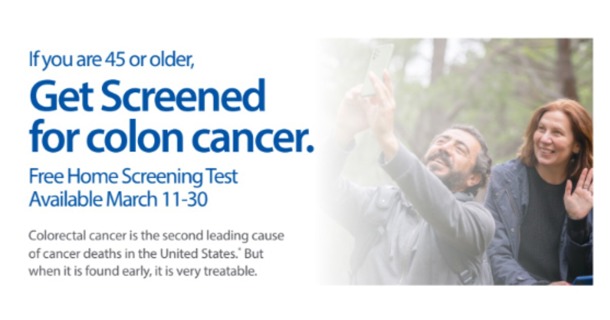Good Samaritan and Area Health Care Facilities Host FREE Colorectal Cancer Screening March 11-31

KEARNEY— Colorectal cancer is the second deadliest cancer in Nebraska. Incidences of colorectal cancer diagnosis and death remain higher in Nebraska compared to overall U.S. rates. Additionally, of all cancer deaths in people under 50, colorectal is now number one in men and number two in women.
Colorectal cancer can be caught early or even prevented through regular screenings. Many people do not realize that the official recommended age for colorectal cancer screening has been reduced from 50 to 45. Most people should begin screening at 45 years.
CHI Health Good Samaritan and several area health care facilities have joined forces during Colorectal Cancer Awareness Month to offer FREE screenings.
March 11-31, men and women ages 45 to 75 are encouraged to call 308-865-7884 weekdays from 8 am to 4:30 pm to request a FREE home screening kit that detects hidden blood in the stool–a potential sign of colorectal cancer.
The kit arrives by mail and includes a Fecal Occult Blood Test (FOBT) along with easy-to-follow instructions for at-home collection. Completed tests, returned in the envelope provided, are analyzed. Participants and their primary care physicians are both notified with the results.
Those with polyps, inflammatory bowel disease, radiation to the abdomen/pelvis or a family history of colorectal cancer are at higher risk and should consult their medical provider about earlier and more frequent screenings. Recommended screening options for those at average risk of colorectal cancer include a FIT/FOBT every year, a FIT DNA every 3 years and a colonoscopy every 10 years. A colonoscopy is still the most effective way to detect colon cancer. After age 75, individuals should consult their medical provider about continued colorectal screening options based on their personal health history.
To request a free home screening kit, visit or call your local participating facility:
CHI Health Regional Cancer Center at Good Samaritan, Kearney, NE, 308-865-7884
Brown County Hospital, Ainsworth, NE, 402-387-2800
Callaway District Hospital, Callaway, NE, 308-836-2228
Community Hospital-McCook, McCook, NE, 308-344-8550
Gothenburg Health, Gothenburg, NE, 308-537-4075
Lexington Regional Health Center, Lexington, NE, 308-324-8592
West Holt Medical Services, Atkinson, NE, 402-925-2811
Fact about Colorectal Cancer from Nebraska Cancer Coalition (NC2) www.necancer.org/Colorectal-Cancer
-NC2 is a nonprofit organization that connects people and resources to strengthen cancer prevention, detection, and quality of life in all 93 counties of Nebraska.
-Colorectal cancer is the second leading cancer killer in Nebraska and our state ranks 34th in screening rates
-In 2024, the American Cancer Society estimates 940 new cases in Nebraska.
-In 2024, the American Cancer Society estimates 380 deaths in Nebraska.
-Colorectal cancer incidence and mortality rates are higher in Nebraska when compared to overall U.S. rates.
-In 2022, 35.9% of eligible Nebraskans were NOT up to date on screening, which increased from 27.5% in 2020.
-45 is the new 50 for colorectal cancer screening. Regular screening, beginning at age 45, is the key to preventing colorectal cancer and finding it early.
-Of all cancer deaths in people under 50, colorectal is now number one in men and number two in women.
Lowering the recommended age for lifesaving colorectal cancer screening makes it available to more Nebraskans, increasing prevention and early detection.
Colorectal cancer is on the rise among young adults and among those who are too young to begin screening.
-Colorectal cancer is expected to be the leading cause of cancer-related death among 20-49-year-olds by 2030.
Up to 30% of people diagnosed with colorectal cancer have a family history of the disease, which is why they should start screening early. Young people with a family history should have a conversation with their health care provider about when to start screening. Two thirds of young adults’ experience symptoms of colorectal cancer for many months before being diagnosed.
